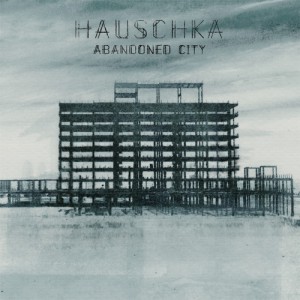Throughout there’s a feeling of industriousness; the record’s like a production line; these restless, fluid, but preplanned rhythmical structures that ebb and flow through the music, almost becoming narrative threads over a number of tracks.
Throughout there’s a feeling of industriousness; the record’s like a production line; these restless, fluid, but preplanned rhythmical structures that ebb and flow through the music, almost becoming narrative threads over a number of tracks.

http://www.cityslang.com http://www.konkurrent.nl
A new Hauschka LP! The world should stop and pause, and pay libation. Knowing full well that it won’t, then you and I, at least, should stick this beautiful and powerful record on and let it inform our day. For this is a release you really need to hear, if anything for its sense of clarity and purpose. Abandoned City feels like a big record; big in scope, attack, (it’s very strident in places) mood, and sound. And a lot more concentrated; though in a way that’s a given, as Hauschka’s last few releases have been full blown collaboration/remixes, ones that were lots and lots of fun but ones that didn’t lend themselves to an overarching conclusion .
The music is purposeful on Abandoned City. You’ll notice the power of Hauschka’s playing a lot more on this release; there’s a real direction given to the piano’s role, especially in the way the arpeggios, (near-abstract) stabbed notes and fluid runs and are welded into a rhythm, almost like the girders of the building frame on the cover. The way Pripyat builds up and breaks down is especially powerful; there’s a beautiful coda amidships that allows the pressure to escape and the track to reform, only to dissolve again as if into a mist. Throughout there’s a feeling of industriousness; the record’s like a production line; these restless, fluid, but preplanned rhythmical structures that ebb and flow through the music, almost becoming narrative threads over a number of tracks. Thames Town really sounding like some maniac sweat shop and this industriousness can be heard in Agdam and Barkerville as well. They don’t hang about. They also boast a bit of a groovy edge; a hip shaking quality that’s always been there in his music, but often brought out by other people.
We do get Hauschka’s maudlin side in Who Lived Here? And which does initially remind you of his earlier work like Foreign Landscapes. Here, tracks like Craco, Who Lived Here?, and Sanzhi Pod City have less of the wallflower quality that stuff like Mount Hood had. These new tracks are more tragic, full of Sehnsucht, and imbued with a lot more colour. The last track, the slow plodding, patient Stromness, is possibly the one that best expresses this emotive side of the record; as well as drawing on all the narrative and textural threads elsewhere, to come to a very satisfying conclusion.
So there you have it. Get it. Like the rest of his work, it’s well worth your time.
